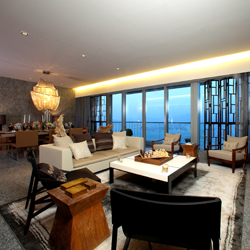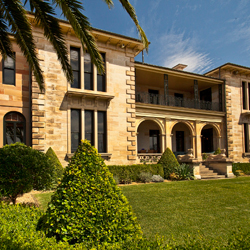If you think London house prices are expensive, think again.
Hong Kong has topped a list of the world’s most expensive cities, with prime real estate changing hands for an eye-watering £6,700 per square foot – double that in London, according to London-headquartered estate agent Savills, which yesterday unveiled a new addition to its indices tracking the property market.
At the World Cities briefing held in London last night, Savills revealed a new global billionaire property index which found that Asian cities have recorded the greatest five-year price rise in prime property, led by Hong Kong which is "in another league".

Bay Villas, Shouson Hill Road, Hong Kong, Savills
Tokyo ranks number two in terms of price per square foot, at £5,190, while Paris comes in third at £3,270 per square foot. London is ranked fourth at £3,090 per square foot and Moscow comes in fifth at £2,520 per square foot.
Of course the size of property must be taken into consideration. Billionaires’ homes in Hong Kong may cost more on a price per square foot basis but they are amongst the smallest – averaging just over 5,000 square foot, only ahead of Moscow at 4,600 square foot. Sydney gives the most bang for your buck, at almost 20,000 square feet.
Fastest growing in terms of price were Singaporean prime real estate at 144 per cent, Mumbai at 138 per cent and Moscow at 110 per cent, in the five years to the end of 2010. Shanghai bucked the trend, with ultra-prime property underperforming the average in the city .
Global billionaires boom
Top property in the top ten world cities has been buoyed by a growing class of jet-setting entrepreneurial super-rich, while mainstream real estate markets are still floundering in the wake of the global recession.

Conduit Road Mid-Levels Hong Kong, Savills
“World class cities not only attract international business, they are also the haunt of a growing number of global billionaires who are increasingly important investors in residential real estate and their wealth is creating a new global super class of real estate,” said Yolande Barnes, head of residential research at Savills.
The new index showed that the homes of the super rich in the top ten cities worldwide grew an average of 10 per cent in value in the five years to 2010. The top ten cities were Hong Kong, Tokyo, Paris, London, Moscow, New York, Shanghai, Singapore, Mumbai and Sydney. This compared to average price growth of 6 per cent for a range of ordinary properties in the same cities.
“The billionaire property markets in these cities have more in common with each other than they do in the mainstream markets of the countries they operate in,” said Barnes.
“Global billionaires can make any country their home and often have several different residences across the globe. Most will seek a base where they are doing business.”
She added that this has the effect of funneling global equity into the top real estate – a rare commodity in any city.
Old v new world
In general terms, the "old world" super prime markets have recorded lower price growth than the emerging markets, said Savills. London, Paris and New York are now beginning to look good value for the global super rich, as they offer the relative price stability and political stability associated with more mature markets.
“Within the ‘old world’ it is the more cosmopolitan cities that have fared much better than those that place restrictions on foreign purchasers or which are simply less likely to attract them,” said Barnes. “London in particular has been a real magnet for international wealth in recent years and saw net inward investment of over £3.3 billion in 2010, while Paris has seen recent sharp price rises, boosted by its position as an attractive entry point to the Shengen visa territory,” she added.

Wylde St Potts Point, Sydney, Savills
For a good investment, Sydney is still great value for money and is well-located to take advantage of Asian wealth if and when its policies restricting international buying are relaxed.
